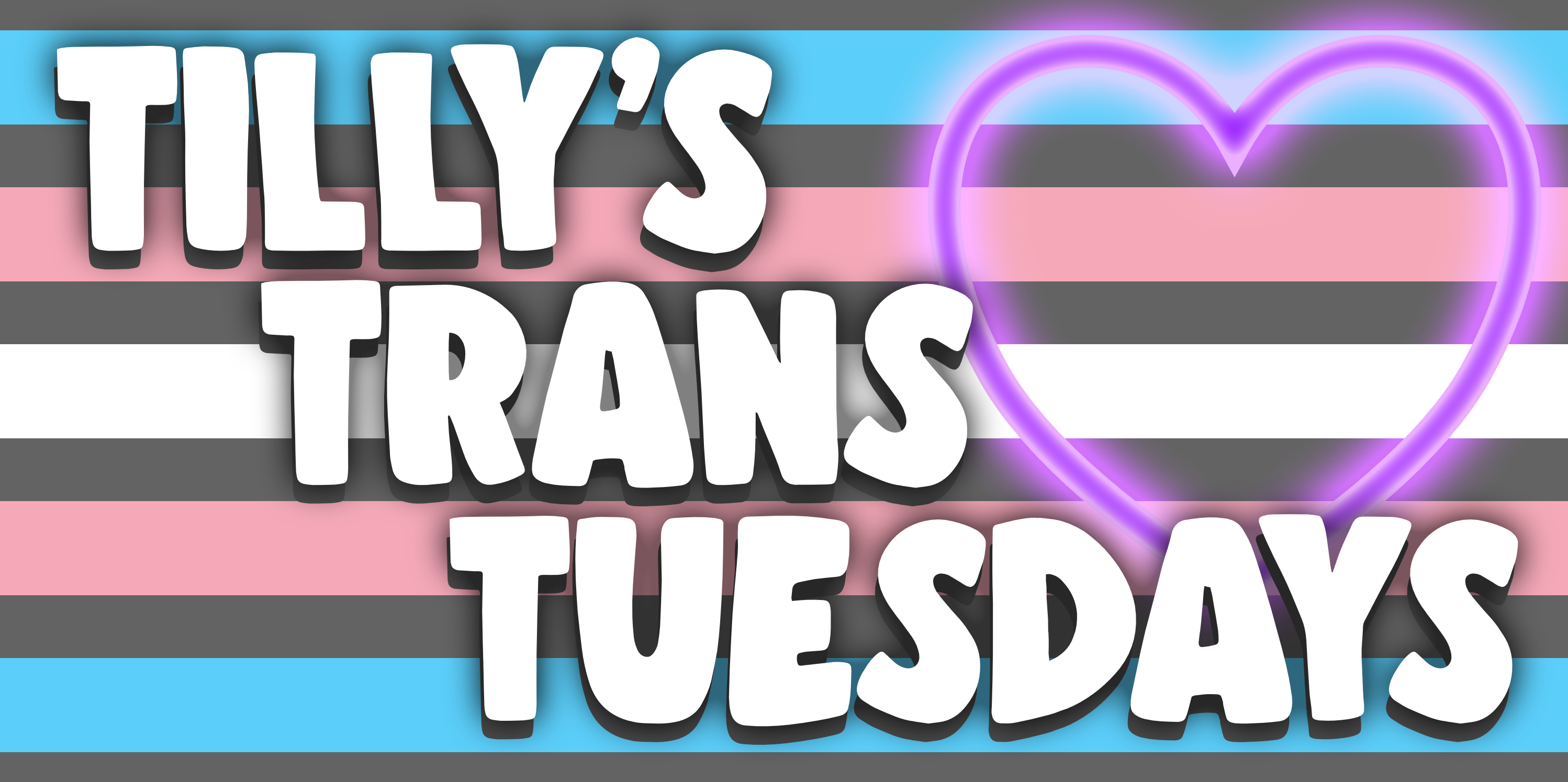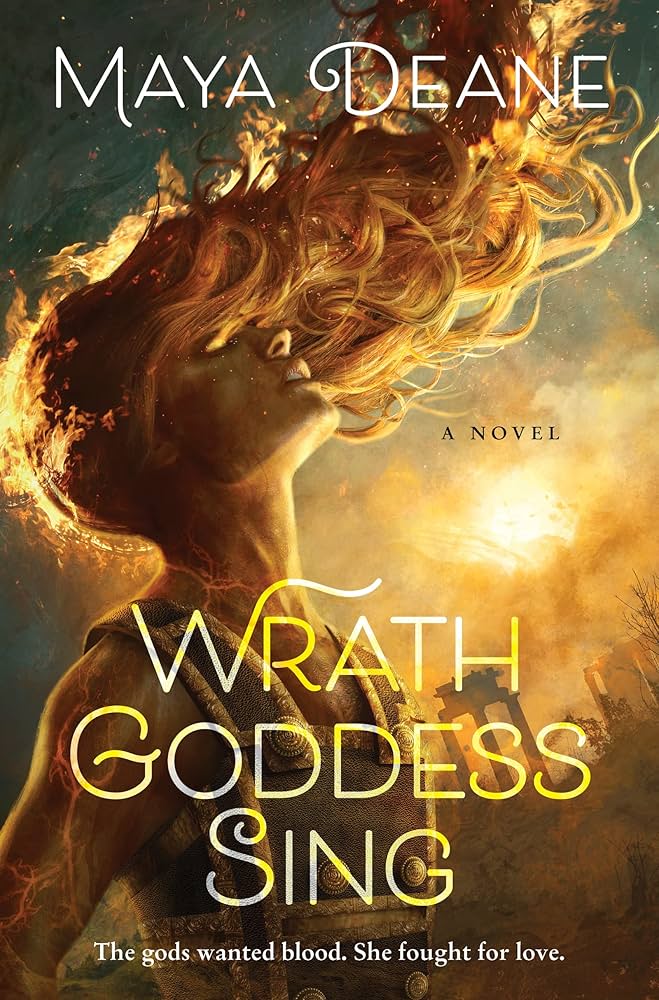Welcome to #TransTuesday! This week is a first for us, as we begin a two part interview with @mayadeanewriter, author of WRATH GODDESS SING – a retelling of the ILIAD with Achilles as a trans woman. To say the book affected me down to my core is an understatement.
This week we discuss pitching trans stories, why “Achilles as a trans woman” was a story she wanted to tell, the painting of trans women as violent sex offenders, catharsis and trans women’s rage, and the imperfect world Achilles lived in (and how that changes when she’s trans).
This interview will read fine whether you’ve read the book or not! There are only the mildest of story spoilers, as we talk more about the trans aspects rather than character or plot details of the story. But as a reminder this is a retelling of a myth that’s thousands of years old.
If you don’t already know the story of Achilles and the Iliad, and don’t want to be spoiled on a very well known ancient Greek myth, read the book first! If you’ve read the book, this will be enlightening. And if you haven’t, you’re going to want to dive in after this, I think.
Grab yourself a copy of the book direct from the source:
https://www.harpercollins.com/products/wrath-goddess-sing-maya-deane
Or on Amazon to help boost its rankings:
https://www.amazon.com/Wrath-Goddess-Sing-Maya-Deane/dp/0063161184/
The book is so, so deeply about the experience of being a trans woman, and I’ve never read something so incredibly in your face about what it’s like to exist in the world as us, that so profoundly speaks to the simmering rage we feel at the unjustness of how we’re treated.
On top of that it’s a fantastic fantasy novel and an excellent retelling of the Iliad. It’s a great read all around that gets my highest possible recommendation. Wanting more info, I’d read several interviews with Maya but most only glance across the transness of it all.
I’ll preface all of my questions with a TB:, and all of her replies with an MD:, so it should be clear where my questions end and her answers begin. Let’s go!
TB: As a trans writer myself, I’ve found it can be difficult to pitch projects that are explicitly trans to cis people (usually cishet white men) because many seem to have difficulty connecting to the themes as it’s so far outside their experience.
TB: Yet they’re the gatekeepers to getting our stories out there, especially on a wider scale. Can you talk a bit about what the process of getting a publishing contract for Wrath Goddess Sing was like?
TB: Did you receive any pushback, notes from people who couldn’t understand the trans experience, or changes you were asked to make that would have taken the story further away from its transness?
MD: Honestly, some of my greatest supporters have been cishet white men, including my agent Jason Yarn & my editor David Pomerico, who understood from an early stage that I would face challenges bringing trans women’s literature to market and worked hard to meet those challenges.
MD: In general, I wasn’t asked to make changes that would blunt the impact of the work, though some of the other editors we considered certainly wondered if it were possible for a book about a transfeminine Achilles to succeed in a post-Song of Achilles market.
TB: What made this the story you wanted to tell? By which I mean, why tell the story of Achilles as a trans woman, rather than an entirely new story with a trans woman lead?
TB: What was it specifically about Achilles’ story that made it the right fit? Or was it something about the myth of Achilles’ story specifically that inspired the concept?
MD: I have always been bothered by the way that Achilles’ time on Skyros was treated in retellings. In the ancient accounts, Achilles’ years living as a girl named Pyrrha are sometimes glossed over and sometimes taken more seriously…
MD: …and if we look at the visual arts traditions as well as the literary ones, we soon see that Achilles has sometimes been presented as a crossdressing man and sometimes as a trans woman since ancient times.
MD: This has resulted in attempts to specifically “rescue” Achilles from accusations of transfemininity; for instance, Statius’s Achilleid frames Achilles as an angry, manly Roman vir furious at being sent to Skyros to live as a girl…
MD: …who promptly decides to take the opportunity to invade women’s spaces and rape Deidamia — which, to an audience of manly Roman men, would have been far more honorable than being a trans woman.
MD: But when I asked myself, “How would the story go if Achilles was simply a trans woman?” I felt the seismic realignment of an entire world beginning to grind into motion, and as the continental plates of my imagination slid into place, I knew I had to tell her story.
TB: I think that’s a really powerful thing. Not just to take this larger than life mythical figure and deeply explore how the story would be different if she were a trans woman, but to reclaim the character from depictions as a violent rapist.
TB: It also speaks in a meta sense to a lot of what we trans women face in present society… like the “bathroom bills” that won’t stop cropping up, positing to ban us from public life for the non-existent, imagined crime of us as violent rapists. Was that part of your intent?
MD: Well, I certainly do not appreciate the way we’re slandered and libeled — though I think the accusations are simply a pretext for treating us the way transmisogynists already want to treat us.
MD: One thing I was interested in exploring with Achilles is the essentially cowardly nature of transmisogyny. You’ll notice that none of her childhood tormentors considered it a matter of principle worth dying for; they harmed her when she was a child without power…
MD: …but accommodated her when she became a divine, destructive force. People attack us in large part because they think they can get away with it.
TB: I’ve read other books by trans authors, other books featuring trans characters, but nothing else has yet matched Wrath Goddess Sing in how much rage a lot of us are filled with, based on the way we’re treated by society.
(If you missed it, here’s the Trans Tuesday on TRANS RAGE. And its follow up, TRANS RAGE 2: CIS APATHY.)
TB: I’ve not seen that touched on in quite that way before. What was the process like for you, having to dig deep into that very specific feeling… that rage that makes our blood boil at the injustice of it all?
MD: Cathartic. That’s how I feel all the time.
TB: It really felt that way for me, too, just in reading it. I’ve often said the rage of trans women burns hot enough to power the sun, and I’ve never seen it explained or described as well as it is in Wrath Goddess Sing.
TB: The injustice of it all is so hard to deal with. And this book felt like a megaphone attached to my heart, saying all the things I feel for the world to hear.
TB: It was like a release valve for all this pressure that builds up over time. I don’t know if you also intended it to be cathartic for all of us, but it certainly was for me. So thank you for that, truly.
MD: I intended that.
TB: As this was a retelling of the Iliad but through the lens of Achilles as a trans woman, how did you decide what to keep from past iterations and what to change?
TB: I identified with Achilles on a lot of levels, even though our personalities are wildly different, but she still owned slaves. That kept her a little distant as slavery is so abhorent.
TB: And rigid class systems were still in place. Why keep those things, when so much else was already changing, and in a world filled with gods and magic?
MD: Because the particulars of her society structured her experience. Those were the constraints she faced.
MD: Like many Bronze Age aristocrats, she knew herself to be literally descended from the gods — and yet her society, like most historical societies, was built on grinding oppression. This is not a contradiction we can handwave away.
MD: Our own prosperity is also built on abhorrent economic systems and rigid classes; we communicate like gods, with bound lightning, over vast distances, but our devices were created through poisonous extraction and unfree labor.
MD: Some writers might choose to look away from the horrors underlying their story’s world, but I think that’s cowardly, and I think Achilles’ ability to grasp the horror of her society — and, in her own flawed and limited way, struggle against it –…
MD: …is far nobler than trying to pretend to an innocence none of us actually has. Why write contemporary fiction in a world of capitalism? Why write anything less than utopia? Because we live in history, in the world the gods made, and none of our hands are clean.
MD: For those who are interested in knowing more about Mycenaean forms of servitude, what you see in Wrath Goddess Sing is actually a hybrid of the Archaic Greek war-captive system that’s described anachronistically in the Iliad…
MD: …and the Mycenaean Greek system of bondage that is carefully recorded in the Bronze Age palace archives. The book explores the way a cataclysmic war with mass looting interacts with an existing system of servitude.
We’ll wrap it there this week! Thanks again to @mayadeanewriter for doing this interview, and being so forthright and open about everything. It was a joy for me.
Catch part 2 next week! We discuss more trans characters, gender dysphoria, how specifically the book speaks to the trans woman experience (including some of my favorite bits that hit me like a freight train), and where she goes from here.
Tilly Bridges, end transmission.
tillysbridges@gmail.com

